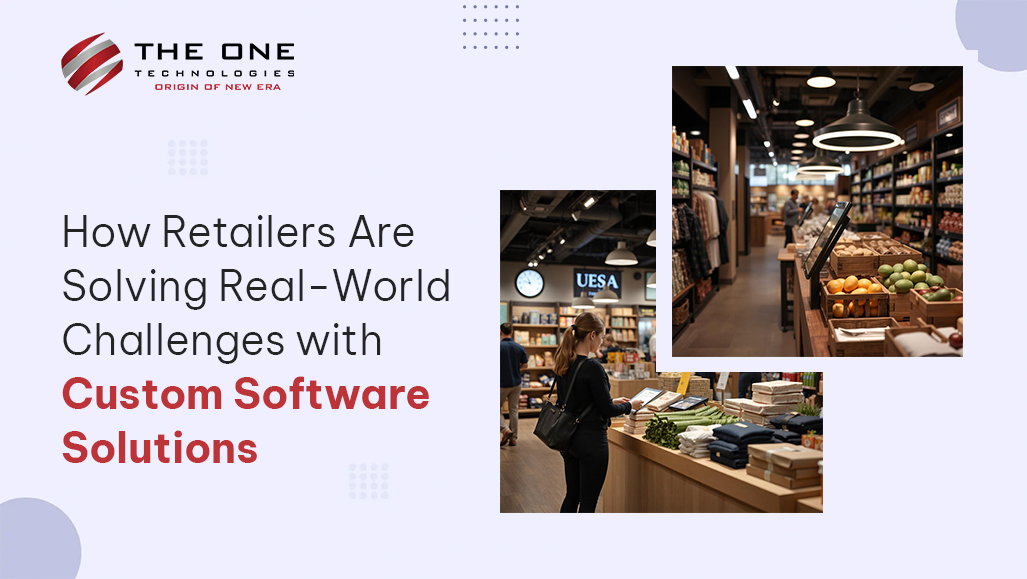How Custom Software Solutions Are Transforming Retail Operations

Retailers are confronted with all sorts of problems in today's highly competitive, technology-driven era, from having to manage products across channels to providing perfect customer experiences. More and more retailers are looking for custom retail software solutions to solve their own operational, customer, and technology problems, even if off-the-shelf programs address some.
Retailers can transform their business, increase agility, and meet changing customer expectations by investing strategically in custom software. It's more than just a technical development.
Let's look at how retailers are using specialised technology, such as custom retail software development, to overcome operational challenges and thrive in a competitive market.
1. Omnichannel Retailing: Creating a Unified Experience
The challenge: Whether making a purchase online, in-store, or via a mobile app, customers expect a seamless experience. The inability of most retailers to effectively coordinate these channels may result in inconsistent pricing, disparities in inventory, or disconnected customer experiences.
The solution: Custom software can connect multiple sales channels to one platform. They are building central dashboards to synchronize product data, customer lists, and orders in real-time. That allows customers to start a purchase on one channel and complete the sale on another without disruption.
Retail in Action: To link its e-commerce store with its bricks-and-mortar stores, a mid-market fashion retailer employed a custom-built retail management system. Consequently, it lowered cart abandonment, boosted customer loyalty through enhanced personalization, and enhanced inventory accuracy by 40%.
2. Inventory Management: Reducing Waste and Stockouts
The challenge: Overstocking, stockouts, and resource waste are the results of poor inventory management. Using inflexible inventory systems or manual processes frequently leads to expensive inefficiencies.
The solution: Stores are investing in custom inventory management solutions with capabilities such as real-time inventory updates, AI-based demand forecasting, and supplier integration. These solutions are customized to their specific product lifecycle, seasonal patterns, and supply networks.
Retail in Action: IoT sensors and a custom inventory solution were developed by a grocery store retailer to monitor shelf stock levels in real time. This helped the brand increase restocking efficiency significantly and reduce waste from perishable products by 25%.
3. Personalization and Customer Engagement
The challenge: Customers anticipate individualized experiences, including communications, offers, and recommendations based on their actions. Conversions and loyalty are no longer increased by generic marketing.
The solution: Tailored CRM and customer analytics solutions enable retailers to monitor purchase history, browsing activity, and preferences in order to provide extremely personalized interaction. Targeted campaigns can also be automated by custom software in relation to segments and patterns of engagement.
Retail in Action: A high-end footwear store deployed a personalized recommendation engine using AI to propose products based on previous buys and fashion interests. Open rates through email were 60% higher, and average order values were 18% higher.
4. Seamless Checkout and Payment Integration
The challenge: Slow or complicated checkout processes can result in cart abandonment, especially on mobile devices. Retailers also need secure, reliable payment systems that support a range of options, from cards to digital wallets and BNPL (Buy Now, Pay Later).
The solution: Custom Point of Sale and payment solutions enable retailers to adapt checkout processes, provide flexible payment methods, and incorporate loyalty plans. They are also simpler to scale and modify as new payment technology becomes available.
Retail in Action: A fast-growing electronics retailer developed a custom mobile checkout solution with one-click payments and QR code scanning. The result? A 30% increase in completed mobile transactions and significantly shorter queues in-store.
5. Data-Driven Decision Making
The challenge: It is challenging for retailers to turn the huge amounts of data they collect, from sales figures to consumer comments, into actionable insights. Industry-specific KPIs and needs might be outside the capabilities of out-of-the-box analytics software.
The solution: Retailers can gain insights from key metrics like sales trends, customer behavior, and store performance by utilizing customized analytics dashboards and reporting solutions. Solutions can be customized to offer warnings, projections, and suggestions in line with the retailer's strategic goals.
Retail in Action: To evaluate local sales and improve marketing campaigns, a chain of home décor stores created a special business intelligence (BI) tool. The return on investment for seasonal campaigns increased by 22% because of their enhanced comprehension of purchasing trends.
6. Employee Productivity and Workflow Automation
The challenge: Frontline employees are crucial to retail operations. Efficiency and morale can be hampered by manual scheduling, a lack of communication tools, and tedious administrative work.
The solution: Custom workforce management apps are being developed by retailers to automate shift scheduling, monitor employee performance, and improve internal communication. This increases employee accountability and frees up time for tasks that are customer focused.
Retail in Action: For employees to manage schedules, access training, and report problems, a big department store created a unique mobile application. Employee satisfaction rose by 35% as a result, and the calibre of customer service improved noticeably.
Why Custom Software Over Off-the-Shelf?
While off-the-shelf tools offer speed and affordability, they often lack the flexibility and scalability retailers need in a rapidly evolving market. Custom software solutions offer:
- Tailored functionality for specific business needs
- Scalability to support growth
- Integration capabilities with legacy systems and third-party tools
- Competitive advantage through innovation and differentiation
The Conclusion
Retail is no longer about selling things, it's about creating experiences. Custom software is enabling retailers to evolve with changing consumer habits, simplify operations, and tap into new sources of growth. From optimizing stock to personalizing marketing to automating back-end tasks, the force of custom tech is redefining the future of retail.
Retailers who get on board now are not only fixing today's issues, but they're also laying the groundwork for tomorrow's success.
Looking to build a custom retail software solution? Partner with our experts who understand the challenges of modern retail and can deliver technology that drives real results.



_638830008354675424.png)





